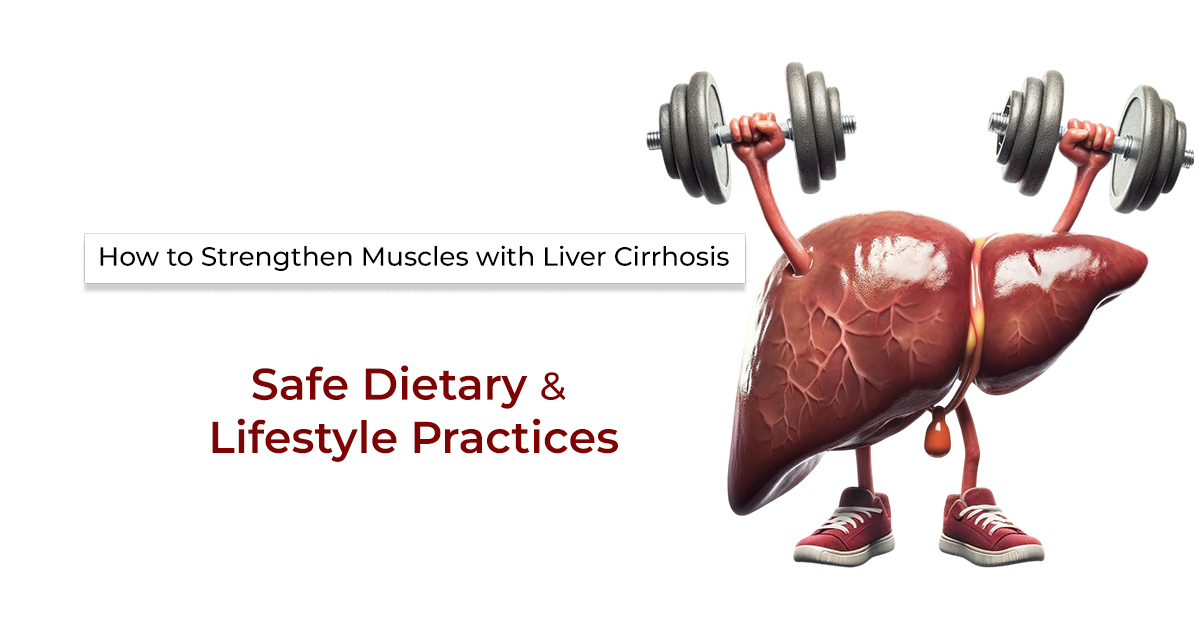


Published On 25 Nov, 2025

Liver cirrhosis is a chronic condition where healthy liver tissue is replaced by scar tissue, affecting the liver’s ability to function properly. One of the biggest challenges patients face is muscle wasting (sarcopenia), which makes the body weaker, slows down recovery, and reduces quality of life.
But here’s the good news: with the right diet, protein intake, and safe lifestyle changes, it’s possible to preserve and strengthen muscles even with cirrhosis. This blog will guide you through practical steps backed by nutrition science and clinical research.
Cirrhosis patients often experience protein-energy malnutrition, which occurs due to:
This leads to sarcopenia, or loss of muscle mass, making patients more vulnerable to infections, weakness, and hospitalization.
Maintaining muscle strength in cirrhosis is vital because it:
Protein Intake in Cirrhosis
Contrary to old myths, cirrhosis patients should not avoid protein. In fact, protein is crucial for muscle preservation.
Best Foods for Cirrhosis Patients
Specialized Supplements
Some patients may struggle to meet protein requirements from food alone. That’s where medical nutrition supplements come in - they provide easily digestible, high-quality protein without overloading the liver.
Along with diet, certain lifestyle changes can help strengthen muscles in cirrhosis patients:
For cirrhosis patients struggling with muscle loss (sarcopenia), a specialized supplement can be a game-changer.
ProNocte Nocturnal Protein Supplement is designed to:
By taking ProNocte before bed, patients can ensure muscle support during the critical overnight recovery window.
1. Can cirrhosis patients take protein supplements?
Yes, but only those specially designed for liver conditions, such as branched-chain amino acid (BCAA)-rich or slow-release proteins like ProNocte.
2. How much protein should I eat if I have cirrhosis?
Typically 1.2-1.5g per kg of body weight daily, but always consult your doctor for personalized advice.
3. What exercises are safe for cirrhosis patients?
Low-impact exercises like walking, resistance band training, and light yoga are generally safe. Avoid heavy lifting without medical clearance.
4. Should cirrhosis patients avoid meat?
Not necessarily. Lean meats, fish, and eggs can be excellent protein sources. However, portion sizes and cooking methods matter.
5. How can I prevent muscle wasting in cirrhosis?
A combination of adequate protein intake, supplements if needed, light exercise, and proper rest is key.
Muscle loss in liver cirrhosis is common, but with the right strategies, it can be managed. A protein-rich diet, safe exercise, and lifestyle modifications can make a significant difference in preserving muscle strength.
If you or your loved one is struggling with sarcopenia due to cirrhosis, consider ProNocte Nocturnal Protein Supplement. It’s tailored to support muscle health at night, when the body naturally recovers and rebuilds.
Remember: Always consult your doctor or dietitian before making major dietary or supplement changes.
 Disclaimer
DisclaimerProNocte is a health supplement and is not intended to diagnose, treat, cure, or prevent any disease.